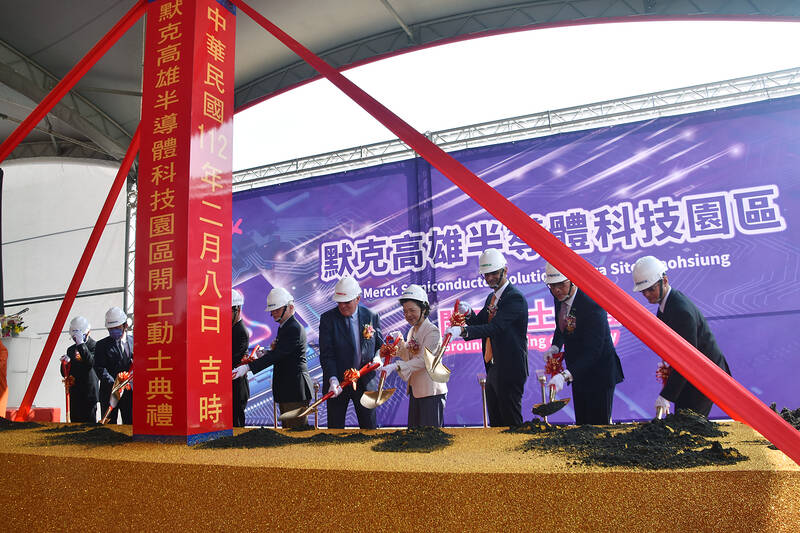Merck Group yesterday held a groundbreaking ceremony for its new semiconductor solutions mega site in Kaohsiung, as the German company looks to bolster supply chain resilience and growth.
The new site marks the second phase of Merck’s investment in Taiwan after the completion in October last year of its phase 1 investment, with the inauguration of a Delivery Systems and Services site in Kaohsiung.
LONG-TERM PLAN

Photo: Su Fu-nan, Taipei Times
Merck plans to invest 500 million euros (US$537 million) in Taiwan over the next five to seven years, with a focus on semiconductors.
The company is implementing a “Level Up” global growth program for its electronics business, aiming to invest more than 3 billion euros by 2025.
The 15-hectare site in Kaohsiung is Merck’s first move to integrate comprehensive product lines from different technology fields, including thin film and specialty gases, into one single location, the company said in a statement.
The investment is an important building block in Merck’s ambition to capture growth opportunities offered by accelerating global demand for innovative semiconductor materials, it said.
The first product lines are expected to become operational by 2025 and will ramp up in phases, Merck said, adding that the investment is expected to create more than 400 jobs.
HUGE MARKET
“Taiwan is a huge market for semiconductor materials and advanced manufacturing. With the establishment of our Semiconductor Solutions Mega Site in Kaohsiung, we aim to work closely with customers to push the technological boundaries in this exciting industry,” Kai Beckmann, a member of the executive board at Merck KGaA and CEO of Merck Electronics, said in the statement.
The new site will host multiple first-time mass-production lines for more innovative semiconductor materials for Merck’s customers, said Anand Nambiar, executive vice president and global head of Merck Semiconductor Materials.
By expanding the company’s capabilities and capacities in Taiwan, it will serve as a powerhouse to speed up customers’ research and development, advance chip manufacturing and build a strong base for boosting supply chain resilience, Nambiar said.

POWERING UP: PSUs for AI servers made up about 50% of Delta’s total server PSU revenue during the first three quarters of last year, the company said Power supply and electronic components maker Delta Electronics Inc (台達電) reported record-high revenue of NT$161.61 billion (US$5.11 billion) for last quarter and said it remains positive about this quarter. Last quarter’s figure was up 7.6 percent from the previous quarter and 41.51 percent higher than a year earlier, and largely in line with Yuanta Securities Investment Consulting Co’s (元大投顧) forecast of NT$160 billion. Delta’s annual revenue last year rose 31.76 percent year-on-year to NT$554.89 billion, also a record high for the company. Its strong performance reflected continued demand for high-performance power solutions and advanced liquid-cooling products used in artificial intelligence (AI) data centers,

SIZE MATTERS: TSMC started phasing out 8-inch wafer production last year, while Samsung is more aggressively retiring 8-inch capacity, TrendForce said Chipmakers are expected to raise prices of 8-inch wafers by up to 20 percent this year on concern over supply constraints as major contract chipmakers Taiwan Semiconductor Manufacturing Co (TSMC, 台積電) and Samsung Electronics Co gradually retire less advanced wafer capacity, TrendForce Corp (集邦科技) said yesterday. It is the first significant across-the-board price hike since a global semiconductor correction in 2023, the Taipei-based market researcher said in a report. Global 8-inch wafer capacity slid 0.3 percent year-on-year last year, although 8-inch wafer prices still hovered at relatively stable levels throughout the year, TrendForce said. The downward trend is expected to continue this year,

Vincent Wei led fellow Singaporean farmers around an empty Malaysian plot, laying out plans for a greenhouse and rows of leafy vegetables. What he pitched was not just space for crops, but a lifeline for growers struggling to make ends meet in a city-state with high prices and little vacant land. The future agriculture hub is part of a joint special economic zone launched last year by the two neighbors, expected to cost US$123 million and produce 10,000 tonnes of fresh produce annually. It is attracting Singaporean farmers with promises of cheaper land, labor and energy just over the border.

US actor Matthew McConaughey has filed recordings of his image and voice with US patent authorities to protect them from unauthorized usage by artificial intelligence (AI) platforms, a representative said earlier this week. Several video clips and audio recordings were registered by the commercial arm of the Just Keep Livin’ Foundation, a non-profit created by the Oscar-winning actor and his wife, Camila, according to the US Patent and Trademark Office database. Many artists are increasingly concerned about the uncontrolled use of their image via generative AI since the rollout of ChatGPT and other AI-powered tools. Several US states have adopted